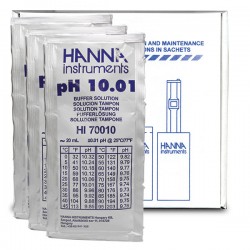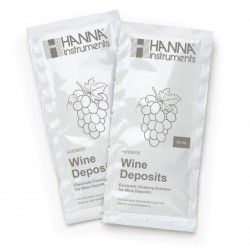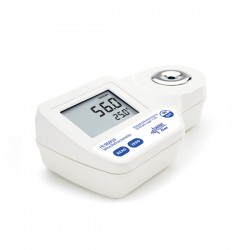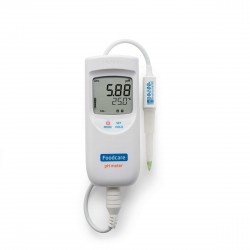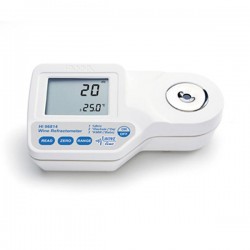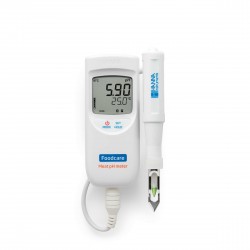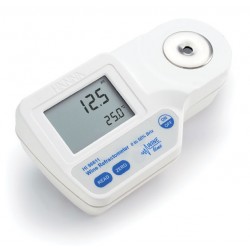






HI-99111 Portable pH Meter for Wine Analysis
HI-99111
The HI-99111 is a portable, waterproof pH and temperature meter designed specifically for the wine industry. The HI-99111 uses the FC10483 glass bodied, pH electrode.
The HI-99111 is a portable, waterproof pH and temperature meter designed specifically for the wine industry. The HI-99111 uses the FC10483 glass bodied pH electrode.
HI-99111 measures pH from -2.00 to 16.00 and temperature from -5.0 to 105.0°C. Automatic calibration is performed at one or two points with two sets of buffers and all readings are automatically temperature compensated. Indicators for stability, battery percentage, and calibration instructions are viewed on the primary display. The HI-99111 uses three 1.5V AAA batteries for an exceptional battery life of 1200 hours of continuous use.
Main features:
- Simultaneous pH and temperature measurements on a large dual-line LCD display
- Automatic pH calibration at one or two points within two memorized buffer sets (standard or NIST)
- Selectable temperature unit (°C or °F)
- Electrode condition indicator
- mV of pH measurement for electrode check
- FC10483 dedicated pH with integral temperature sensor
- Probe quick connect system
- Battery life indication and low battery detection
- Keystroke confirmation tone
- Auto-off function
- Waterproof casing IP67
About the electrode
The FC10483 pH probe features an open junction with Clogging Prevention System (CPSTM) technology, has a built-in temperature sensor for simultaneous temperature compensated pH and temperature readings, and also contains an integral pH sensor preamplifier to provide measurements impervious to noise and electrical interferences.
To connect the electrode
With the meter turned off, connect the FC10483 probe to the DIN socket on the bottom of the meter by aligning the pins and pushing in the plug firmly. Remove the protective cap from the probe before taking any measurements.
The importance of pH in wine making
The pH of wine is important to determine because it will affect the quality of the final product in terms of taste, colour, oxidation, chemical stability and other factors. Generally in winemaking, the higher the pH reading, the lower amount of acidity in the wine. Three important factors in determining the pH of wine include the ratio of malic acid to tartaric acid, the amount of potassium, and the total amount of acid present.
Most wines optimally have a pH between 2.9 and 4.0, with values differing based on the type of wine. Values above pH 4.0 indicate that the wine may spoil quickly and be chemically unstable. Lower pH values allow the wine to stay fresher for a longer period and retain its original colour and flavour. High pH wine is more is more likely to breed bacteria and become unsuitable to drink.
For finished white wines, the ideal pH is between pH 3.00 and pH 3.30, while the final pH for red wine is ideally between pH 3.40 and pH 3.50. The optimal pH before the fermentation process is between pH 2.9 and pH 4.0. The pH if wine therefore not only affects the colour of wine, but also the oxidation, yeast fermentation, protein stability, and bacterial growth and fermentation.
Read More
| pH Range | -2.00 to 16.00 pH* | |
| Temperature | -5.0 to 105.0°C* | |
| pH Resolution | 0.01 pH | |
| Temperature | 0.1°C | |
| pH Accuracy | ±0.02 pH | |
| Temperature | ±0.5°C (up to 60°C), ±0.1°C (outside) | |
| pH Calibration | automatic, 1 or 2 point with 2 sets of standard buffers available (3.00, 7.01, 10.01 or NIST 4.01, 6.86, 9.18) | |
| Temperature Compensation | Automatic from -5.0 to 105.0°C | |
| pH Electrode | FC10483 pre-amplified pH and temperature electrode with flat tip, DIN connector, 1m cable (included) | |
| Battery Type / Life | 3 x 1.5V AAA / approx. 1200 hours of continuous use | |
| Environment | 0 to 50°C; RH max 100% | |
| Dimensions | 154 x 63 x 30 mm | |
| Weight | 196g with batteries | |
| * | The FC10483 is limited to be used from 0 to 12 pH and from 0 to 80 °C temperature. |





